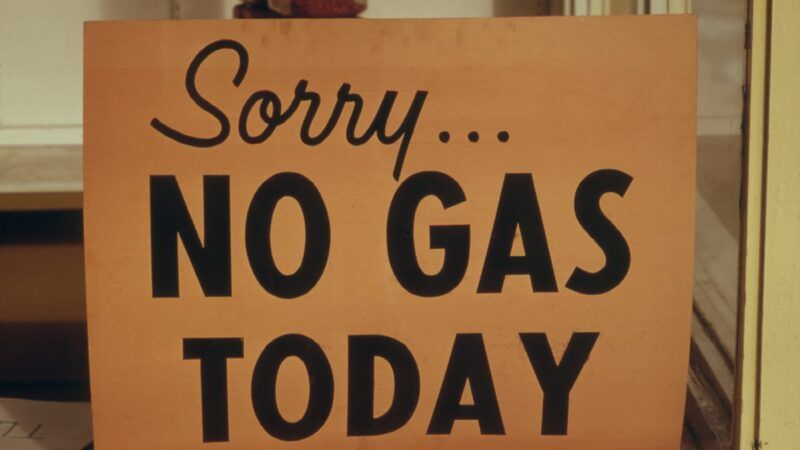Banning 'Unconscionable Excessive' Gas Prices Is Risky Economic Nonsense
Democrats are trying to inject a political solution into an economic problem.

Having failed to learn from history, Congress is apparently determined to force Americans to repeat it.
Earlier this week, the House of Representatives passed a bill granting President Joe Biden, the Federal Trade Commission (FTC), and state attorneys wide-ranging and ill-defined powers to crack down on "unconscionably excessive" gas prices, supposedly in the name of protecting consumers.
What counts as "unconscionably excessive," you might be wondering? That's in the eye of the beholder apparently, as the Consumer Fuel Price Gouging Prevention Act contains no explanation or definition to limit the new executive powers over prices at the pump. Any seller deemed to be "exploiting the circumstances related to an energy emergency" can be targeted with civil penalties or forced to stop selling gasoline at whatever price the authorities have deemed to be excessive. The text of the bill allows the FTC to determine appropriate "benchmarks" for deciding whether some gas prices might be grossly excessive—a neat little trick that effectively allows the FTC to set prices if it chooses to do so.
Of course, price controls, even when enacted in roundabout ways, don't work. History is full of examples demonstrating this basic economic fact, but probably the most on-point example is the gasoline price controls enacted by the federal government in 1971. "The results were disastrous," Jack Rafuse, a Nixon administration energy advisor, wrote in the Chicago Tribune in 2007. "Oil exploration and domestic oil production slowed sharply. And foreign oil poured into the nation's gas tanks, filling the booming demand for price-controlled gas."
When you mess with prices, they tend to mess back. Artificially low prices signaled to consumers that they should keep filling up, but gasoline supplies couldn't keep up. Long lines and rationing were the predictable results.
No one wants to pay more than $4.50 for a gallon of gas—that's the national average right now, meaning many places are seeing even higher prices—but severing the ability of higher prices to signal to consumers that they should buy less is no solution. At best, it merely hides the problem and creates new ones.
Expanding the executive branch's power to crack down on businesses that are merely responding to market conditions is no solution either. The U.S. Chamber of Commerce warns that the legislation will allow the FTC "to make supply and demand mandates for the energy sector," potentially resulting in falling domestic energy production and higher gas prices.
In other words, the 1970s all over again.
Even some Democrats who ultimately supported the bill—which passed Wednesday with a near-party-line vote in the House—seemed to recognize the danger.
Rep. Paul Tonko (D–N.Y.) told E&E News, a trade publication focused on energy and environmental issues, that the bill was "injecting a political solution into an economic problem."
That's exactly right. For months, Democrats have been trying to scapegoat rising prices throughout the economy on supposed price gouging. Sen. Elizabeth Warren (D–Mass.) memorably and bizarrely claimed that higher prices at grocery stores were the result of greedy capitalists, despite the fact that grocery stores operate on some of the thinnest margins of any business thanks to robust competition. Warren and some of her Senate colleagues have introduced a separate bill to give the FTC similar powers over price gouging in all parts of the economy. That bill uses the same vague "unconscionably excessive" framing as the just-passed gas price control bill in the House.
These attempts to deflect blame for the highest inflation rates in 40 years are "dangerous misguided nonsense," according to none other than Jason Furman, one of the Obama administration's top economic advisors.
"The problem with this narrative is that it's just a pejorative tautology," wrote The Washington Post's Catherine Rampell about Warren's bill. "Yes, prices are going up because companies are raising prices. Okay. This is the economic equivalent of saying 'It's raining because water is falling from the sky.'"
To carry that analogy one step further, the bill passed by House Democrats this week might best be understood as an attempt to hack the weather app on your phone to assure you that there's no rain falling now and no chance of rain falling later in the day. Seeing that might make you feel good, but you'll be ill-prepared to deal with the weather when you step outside.
Price controls are lies—pleasant ones, perhaps, but lies just the same—and the government ought not to be in the business of forcing businesses to lie to consumers for political reasons.


Show Comments (121)